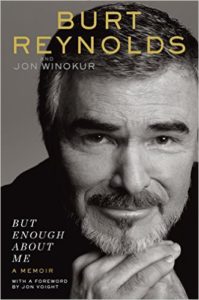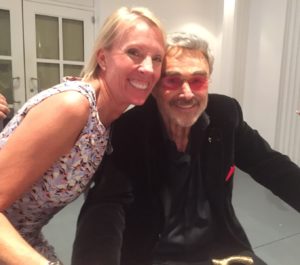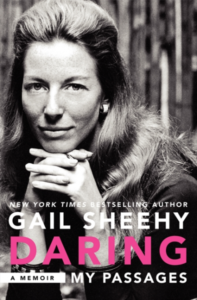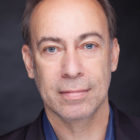 Burt Reynolds tells packed house about his loves, fleeting fame and why he loves living in Jupiter, FL.
Burt Reynolds tells packed house about his loves, fleeting fame and why he loves living in Jupiter, FL.
Burt Reynolds has quite a morning at the Book Festival. It starts out with a Q&A with Scott Eyman, and Burt talks openly about Hollywood, fleeting fame and two loves of his life. He chokes up a little talking about Sally Field, and he talks about his Mensa wife whom he doesn’t name (but who is surely Loni Anderson) and whom he says was brilliant and beautiful, but spent one-and-a-half hours taking off her makeup at bedtime. And then another half-hour “putting on something else on her face… by which time…” Burt pauses, and pretends he’s gone to sleep.
Asked what was special about former girlfriend, Sally Field, he answers: “Everything. She is so talented, and talent is sexy. I respect her and liked her but I screwed up I’m sure.”
He tells the audience he loves living in Jupiter, Palm Beach County. “Palm Beach is home. Your b.s. barometer is handed to you here very early on.” Then, he adds: “Growing old for actors is frightening. They don’t know how to handle it.” He lists the three stages of fame:

“We don’t have a table” Then: “Which table would you like Mr. Reynolds?” And finally: “We don’t have a table.” He says: “You have to be able to deal with that last stage. When it stops, you have to be ready to have a life. I’ve always been able to save my butt by laughing at how mean and treacherous Hollywood is.”
Then, Scott turns the questions over to the attendees. Almost immediately he gets hit with a question that causes the room to go absolutely still and quiet: “Buddy?” says the woman sitting in the middle of the auditorium. “Who was your best girl in high school ? The room is quiet. Burt is quiet. Everyone’s got to be wondering what’s coming next. Then Burt peers into the dark auditorium and says: “I can’t see you, but I imagine it was you.” Later, Burt and Ann Lawlor Scurry get together at his book signing, and Ann gets to be on the Today show a week later.
In any event, I feel emboldened, and surmising that nothing else could be as loaded a question, ask Burt, what he thought about tabloids and tabloid stories about him back in the 80s. I preface the question with my disclosure of being a tabloid reporter in those days. I ask him whether the stories written about him had annoyed or hurt him, whether he had ignored them or, I ask: “Is it true, there’s no such thing as bad publicity?”
Burt Reynolds is a true gentleman. Rather than letting me know what he truly thinks right then and there, he shrugs it off saying you can’t exactly ignore the National Enquirer when it’s located right here (as it was, in Palm Beach County, several years ago). However, after he’s answered the next question from the audience, he returns to the issue of tabloids.
“I’ve warned you about what you read, and it’s just not the National Enquirer any more. ” But, he says, there wasn’t much that could be done about tabloids. He mentions one celebrity, Carol Burnett, who sued the Enquirer and who won, but her award was reduced from millions to about $200,000. “I’ve had my share of stuff written about me that wasn’t true, but I’m still here. I didn’t jump out of any windows.”
I wish at that point I had told him I never worked for the Enquirer, but for the kinder, gentler STAR which during my time as reporter and editor was never sued by any celebrity for making up stories. Somehow, I had not expected Burt to be quite so critical of the tabloids especially when compared to today’s media. Of course, as an attorney, I should have known better. Trial attorneys are taught: never ask a question to which you don’t know the answer. Perhaps I should have heeded that advice with Burt.
 Author-Journalists Gail Sheehy and Owen Gleiberman raise questions about “niche” journalism — and those who read it
Author-Journalists Gail Sheehy and Owen Gleiberman raise questions about “niche” journalism — and those who read it
Gail Sheehy is my contemporary, so I know what she is talking about when she says that in the old days women journalists were confined to the womens’ features departments of newspapers, and had to prove themselves before being allowed to join male reporters covering hard news. She recalls she got her big chance to report during the 1968 Democratic primaries covering Robert Kennedy Jr, the senator who was gunned down while campaigning in Los Angeles.
In her memoir, Gail recalls further instances of how women had to prove themselves. For example, she writes about the night she gave birth to her daughter: she had stayed late in the newsroom, on night duty till 10.30pm, then took a bus to her apartment on the Lower East Side, and climbed four flights of stairs before climbing them back down to find a taxi to take her to the hospital. She writes: “I couldn’t ask for time off before I had the baby; that would have classified me as a woman who was not as professional as a man.”
Niche journalism

Owen Gleiberman (Movie Freak, My Life Watching Movies), the former movie critic of Entertainment Weekly also remembers the old days — when “we were unified as a nation, watching the same TV shows. Now, in the digital age it seems like we are more and more a niche society, divided into little groups. We don’t even agree on the same facts anymore.”
Gail interjects, “Can you trust bloggers? Is there any fact-checking any more?”
“Journalism culture is in crisis ,” says Owen. “The free press is an essential check and balance on government. [But] the romance has gone out of journalism. Young people today don’t think it’s their responsibility to be informed.”
Getting the news from social media
I think he is right — for the most part.
I remember a young colleague’s boyfriend telling me a few years ago that soon one would not need cable or broadcast Tv to get the news. It would be fed, streamed through desktop devices, and you could choose the news you wanted to see and hear. That’s the future, he said.
I did not think any such thing would work. But of course, here we are today with millions of users being fed what Facebook – according to some algorithms concocted in cyberspace – “thinks” those users would like to hear.
As Bloomberg news columnist, Megan McArdle (who was not at the Book Festival) wrote a few days ago: “Facebook curates our feeds so that we get more of the stuff we “like.” What do we “like”? People and posts that agree with us. Given that Facebook seems to be the top news source for millenials […] that matters quite a lot.”
One thought on “DAY 2: Palm Beach Book Festival”
Comments are closed.